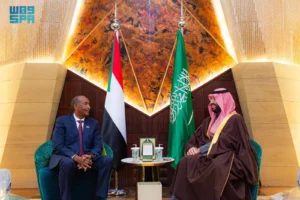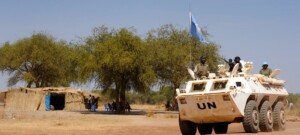Economists: Removal from State Sponsors of Terrorism list essential to Sudan’s recovery
Economists have called on Sudan’s coming transitional government to make efforts to remove Sudan’s name from the list of state sponsors of terrorism, so that Sudan can take advantage of the initiative to relieve Sudan’s debt.
 US Under Secretary for Political Affairs David Hale (US Foreign Affairs Ministry)
US Under Secretary for Political Affairs David Hale (US Foreign Affairs Ministry)
Economists have called on Sudan’s coming transitional government to make efforts to remove Sudan’s name from the list of state sponsors of terrorism, so that Sudan can take advantage of the initiative to relieve Sudan’s debt.
Sudan’s debt has exceeded $58 billion, according to the economists. The initiative to ease it aims to reform the health, education, and transportation sectors, dissolution of levy institutions, encouraging production in the next phase, development of an emergency plan that takes care of the daily needs of citizens and removing injustice from them.
USA perspective
During his visit to Khartoum last week, US Under Secretary for Political Affairs, David Hale affirmed that while “America is fully committed to helping Sudan transition to a civilian-led government that reflects the will of the people,” he cautioned that his country still needs to settle some issues with Sudan before considering removing it from the list of state sponsors of terrorism: “There are a number of things that we look forward to engaging with a civilian-led government in Sudan,” he said, adding that these included human rights, religious freedom, and counter-terrorism efforts, as well as “promoting internal peace, political stability and economic recovery in Sudan”
Significant challenges
The Sudanese economists pointed out that the transitional government will face significant challenges, unless it deletes Sudan from the list of states sponsors of terrorism, which denies the country cooperation from international financial institutions and from obtaining new loans and grants to rebalance the economy.
On Thursday, at a symposium in Khartoum, economists and bankers presented proposals for the first 100-day programme including the introduction of entirely new currency, and a return of cash block to the banking system.
Experts pledged to improve the situation by fighting corruption and improving the business climate, adopting proper policies, tightening official roads, and close outlets to smuggling.
Hyperinflation
Sudan’s Central Statistics Bureau has acknowledged rising inflation in Sudan, where ordinary people have been struggling to make ends meet for months. This has been highlighted in the run-up to Eid El Adha (the Muslim Feast of the Sacrifice) on Sunday.
In a statement via the official Sudan News Agency (SUNA), the bureau claims inflation in Sudan rose to 52.59 per cent in July comparable to 47.68 per cent in June and 44.95 per cent in May.
‘Propaganda tools’
Commenting on last week’s Radio Dabanga report, prominent Sudan researcher and analyst Prof Eric Reeves said on social media: “The TMC has made abundantly clear that none of the generals—particularly Hemeti and EL Burhan—knows the first thing about economics, and thus have made no proposals for economic reform, even as all indicators continue to indicate a disastrously collapsing economy.”
He dismissed the official figures saying that “the Central Bureau of Statistics – as well as the Central Bank of Sudan – have long been part of the ‘deep state’ created by the Al Bashir Regime: they have been converted in large measure to propaganda tools.”
Cash shortage
Radio Dabanga has been reporting for months that banks across Sudan have limited cash withdrawals, becoming worse in the run-up to the overthrow in the Al Bashir regime in April.
The printing of new currency denominations of SDG 100, SDG 200, and SDG 500 by the Central Bank of Sudan has been necessitated by hyperinflation, coupled with a chronic shortage of hard cash. Banks have limited cash withdrawals so traders and the public prefer to keep their money at home, rather than deposit it into banks.
Over the past few months, the value of the Sudanese Pound has dropped steadily against the US Dollar on the parallel market. In December 2018, the Central Bank of Sudan issued a decision to set the limit of cash withdrawals by bank cards at ATMs at SDG 20,000 ($421*) a month.
* As effective foreign exchange rates can vary in Sudan, Radio Dabanga bases all SDG currency conversions on the daily US Dollar rate quoted by the Central Bank of Sudan (CBoS)
Our editorial independence means that we can continue to provide factual updates about political developments to Sudanese and international actors, educate people about how to avoid outbreaks of infectious diseases, and provide a window to the world for those in all corners of Sudan. Support Radio Dabanga for as little as €2.50, the equivalent of a cup of coffee.












 and then
and then